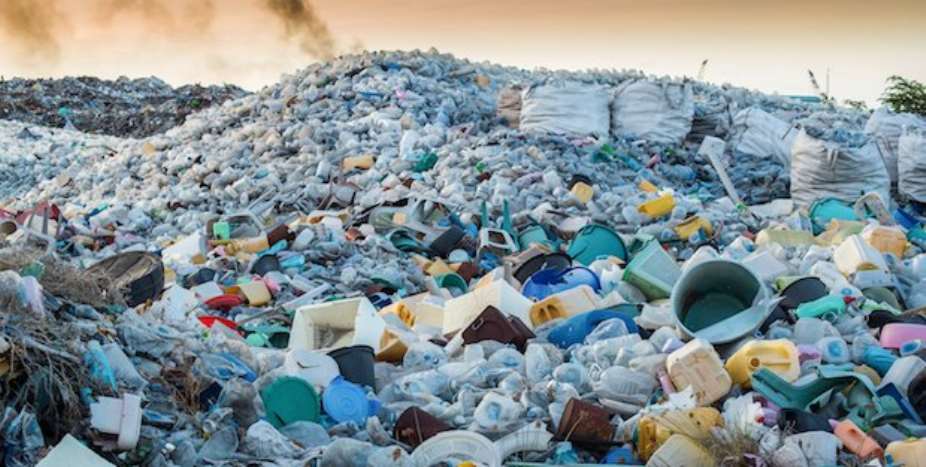Background
Statistics from the Accra Metropolitan Assembly show that more than 912,500 tons of waste are generated annually in Accra. Out of this, only 410,625 tons representing 45 percent are collected while the 55 percent which are mainly plastic remain in the system.
Plastic waste has accounted for a major portion of the total amount of waste generated in terms of net-weight. Only two percent of single-use polyethylene terephthalate (PET) bottles are recycled. The rest get scattered over the streets, choke gutters and drainpipes and resist free flow of water after rainfall.
The Minister for Environment, Science, Technology and Innovation, Prof. Frimpong-Boateng, believes that the increase in the generation of plastic waste globally is as a result of economic growth and changing consumption production patterns. PET recycling is the best way to effectively deal with used up PET bottles and clear the environment of filth, but it isn’t profit-oriented so no company can really do it without government support.
Efforts so far to deal with the problem are not promising enough. For example, a waste management project dabbed “IRECYCLE,” launched by Voltic on November 23, 2018 was able to collect 200kgs of plastic waste by March 3, 2019. This means that only 0.2 tons of plastic waste was collected in a period of four months. Not encouraging.
Effects
The effects of dysfunctional urban waste management systems in the lives of Ghanaians can’t be overemphasized. The World Health Organization (WHO) reveals that about 28,000 premature deaths that occur in Ghana are air-pollution-associated.
The trauma of the June 3, 2015 flood situation is still fresh in the minds of many a Ghanaian who lost a relative on that fateful day. It is further estimated that by 2050, the oceans will contain more plastics than fish by weight. This really calls for general concern.
Efforts to deal with the menace
For over a decade today, conferences, seminers, workshops and other stakeholder engagements have been held intending to deal with the menace of plastic waste. These consultative engagements have been convened by the Ministry of Environment, Science, Technology and Innovation (MESTI). The intention was to advance course in behaviour change of consumers and producers towards less plastic usage and production, respectively.
Government introduced a 10% Environmental Excise Tax (EET) in 2011 targeted at levying plastic manufacturers in Ghana. The purpose of which was to establish a Plastic Levy Fund Authority to harness funds to manage the plastic waste menace in the country. That money to be generated is meant exclusively for plastic recycling.
Way Forward
Section 9 of the Control and Management Regulations Act 2016 (LI 2250) should be enforced. The Act mandates persons who produce beverage products, to set up and manage or join a take-back system for primary and secondary packaging and recycling of waste. It also requires the EPA to decide on recycling rates in consultation with beverage manufacturers and other stakeholders.
Further, the amount realized so far from the Environmental Excise Tax (EET) is almost GH₵1 billion, according to Mr. Botwe, Chairman of the Plastic Waste Management Programme, Ghana (PWMPG). This can be used to assist private partners in the plastic waste recycling business as part of the IDIF initiative to establish recycle plants in all regional capitals.
To add to that, Ghana should introduce legislations to ban the importation and use of non-biodegradable plastic products.
A Comprehensive Sanitation Education (CSE) should be introduced in the school curriculum. The main aim of which should be to inculcate the habit of proper waste handling in kids and to redirect improper behaviour of students at higher level towards patriotism and love for the environment.
Again, the sanitation and hygiene units of the various Metropolitan, Municipal and District Assemblies should be reactivated and equipped to be able to supervise proper disposal of refuse. This can effect change in negative attitude if punitive sanction regimes are enforced.
Proper waste management should be everyone’s concern.
Story by Hafizdeen Akram (Freelance)





 Ejisu by-election: Aduomi warns NPP against voter intimidation
Ejisu by-election: Aduomi warns NPP against voter intimidation
 High Court orders implicated four NDA officials to present defence
High Court orders implicated four NDA officials to present defence
 Let’s all be matured, patriotic to have a peaceful election this year – Dampare ...
Let’s all be matured, patriotic to have a peaceful election this year – Dampare ...
 Mahama's administration saw thievery that knew no bounds; stole from market wome...
Mahama's administration saw thievery that knew no bounds; stole from market wome...
 GRA/SML deal: Always read the stories behind the headlines or you'd look stupid ...
GRA/SML deal: Always read the stories behind the headlines or you'd look stupid ...
 GRA/SML Contract: It takes some 'wild' boldness for a president to make this dec...
GRA/SML Contract: It takes some 'wild' boldness for a president to make this dec...
 Elisu By-election: "If you call yourself a man, boo Chairman Wontumi again" — Bo...
Elisu By-election: "If you call yourself a man, boo Chairman Wontumi again" — Bo...
 Fuel tanker driver escapes with his life after tanker goes up in flames near Suh...
Fuel tanker driver escapes with his life after tanker goes up in flames near Suh...
 Uniform change: ‘Blue and white are brighter colours’ — Kwasi Kwarteng explains ...
Uniform change: ‘Blue and white are brighter colours’ — Kwasi Kwarteng explains ...
 MoE not changing all public basic school uniforms but only newly built ones — Kw...
MoE not changing all public basic school uniforms but only newly built ones — Kw...
